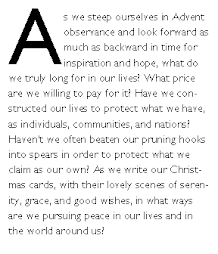Proper 17 B; August 30, 2009
Song of Solomon 2:8-13
Psalm 45:1-2, 6-9
James 1:17-27
Mark 7:1-8, 14-15, 21-23
What moved me most about the coverage of Senator Kennedy’s funeral was learning that the church he chose was the place he had gone for daily prayers while his daughter lay gravely ill in a nearby hospital. He would just come in unannounced, without entourage or fanfare, would kneel and pray, would attend mass, would sit quietly. It was in that place, where he had prayed for healing for his daughter, and dare we say, for himself as a care-worn and weary father, that he wanted the words said over his body which prepared him for his final resting place. I was touched that this ultimate “doer” brought the whole world together yesterday to this place where he had listened intently to hear the word.
“Be doers of the word, and not merely hearers.”
For centuries, there were Christians who regarded that sentence, and the whole Epistle of James that surrounds it, as a second-rate bit of scripture. “An epistle of straw,” Martin Luther called it, fearing that it would focus Christians on work, work, work, law, law, law, do-gooding, do-gooding, do-gooding, and so they would forget the abundant and undeserved grace of God that is at the heart of Jesus’ message. There is no way that we can earn what God through Jesus has done for us – no way that the abundance of God’s love is something that we can turn off or on like a faucet, just because we do, or don’t do something. All those things that James would have us do, Luther thought, can get in the way of our hearing the true word of God’s abundant grace and love.
Over time, though, we find we read scripture differently – the needs of the day cause some words to jump out at us. Aha, we think. This is the word I need to hear right now! This word helps me understand what is going on, what God is trying to say to me right now.
“Be doers of the word and not merely hearers” is one of those texts that kind of lies fallow, in the back of the Bible, as it were, until when we need it, it leaps right to the fore with a clarion call. It’s not that we’ve heard enough of “the word” – how can anyone hear enough of what God has to say? There are times in the world, in our own lives, when we know that God wants us to act – to do something about all those things that God has been telling us about for all those years. Now’s the time, the Epistle of James says, get up. Act. Do something.
You can say that the Epistle of James is just one big to-do list. Don’t get angry, and take care of orphans and widows tops the list. That’s a good place to start: if we let our anger – justified or not – get it our way, it will just block everything else God wants us to do – and then James just gets right on it: take care of those people who have no one else to take care of them.
The Gospel of Mark reminds us about just how much trouble we can get into by being a “doer of the word.” Jesus would have us care not just for the orphans and widows that we like, but ALL orphans and widows. Not just orphans and widows who might come to church – or, as in Jesus’ day, orphans and widows who were “clean” or ate kosher food or who were able to follow all the Jewish laws concerning food and cooking – but ALL orphans and widows. It’s that grace thing, again. That abundant love. That troublesome God who knows no limits, who sets no boundaries, who takes us in no matter how dirty our hands are or whether we have stains on our clothes. It’s not the outside, Jesus says, but the inside. And more than that: even if we carry some bad stuff on the inside, if we let that stuff go, God’s abundant love will come in and fill that place, so that once again we can hear and act on the gracious word of God.
The Song of Solomon, where we get our first lesson today, is another one of those  books of the Bible that is sometimes put on the back burner of our attention. It’s a curious, poetic book that uses the metaphor of erotic love to describe the actions of God in the world. God’s love, God’s grace, God’s abundance knows no limits. God delights in us, and the Word in this book is all about how easy it is for us to delight in God.
books of the Bible that is sometimes put on the back burner of our attention. It’s a curious, poetic book that uses the metaphor of erotic love to describe the actions of God in the world. God’s love, God’s grace, God’s abundance knows no limits. God delights in us, and the Word in this book is all about how easy it is for us to delight in God.
Be doers of this word, and not merely hearers. “The fig tree puts forth its figs, and the vines are in blossom.” Come to the party. Bring everyone you know with you. There is enough to go around.


.jpg)
.jpg)







.jpg)
